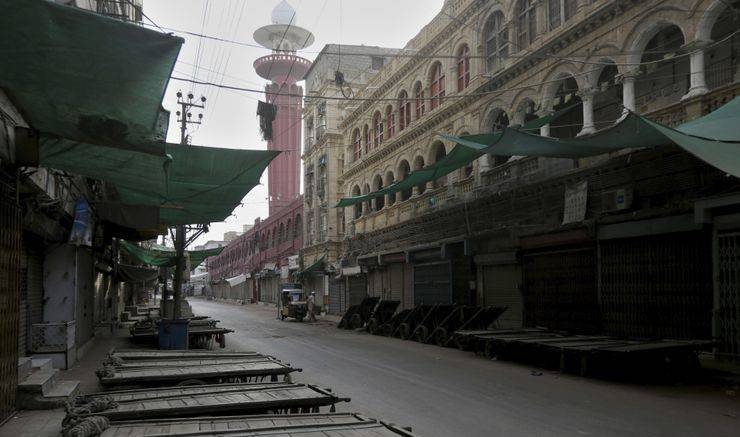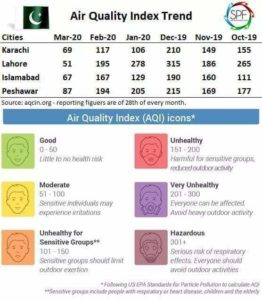
The countrywide lockdown – closure of factories and restrictions on transport – imposed to counter spread of the fatal coronavirus has significantly improved Pakistan’s Air Quality Index (AQI).
The Express Tribune reported that in the on-going month, the AQI level of Karachi dropped from 117 to 69, Lahore from 195 to 51, Islamabad from 167 to 167 Peshawar from 194 to 87.

According to the World Health Organisation (WHO), nine out of ten people now breathe polluted air, which annually kills seven million people. The deaths, in turn, cost the global economy billions of dollars in lost labour.
Data compiled by the Global Alliance on Health and Pollution (GAHP) shows that in Pakistan, an estimated 128,000 people die each year from diseases related to air pollution.
In December 2018, Lahore, Islamabad and Karachi had AQI levels of 336 (Hazardous), 159 (Unhealthy) and 141 (Unhealthy), proving to be an extremely unhealthy end for the year.
Air Quality is the degree to which air is suitable or clean enough for humans, animals and plants. It is impacted by the amount of particulate matter (PM2.5) it carries, which refers to tiny particles of copper, magnesium, lithium, arsenic, zinc, and complex gaseous aerosols.
The Express Tribune reported that in the on-going month, the AQI level of Karachi dropped from 117 to 69, Lahore from 195 to 51, Islamabad from 167 to 167 Peshawar from 194 to 87.

According to the World Health Organisation (WHO), nine out of ten people now breathe polluted air, which annually kills seven million people. The deaths, in turn, cost the global economy billions of dollars in lost labour.
Data compiled by the Global Alliance on Health and Pollution (GAHP) shows that in Pakistan, an estimated 128,000 people die each year from diseases related to air pollution.
In December 2018, Lahore, Islamabad and Karachi had AQI levels of 336 (Hazardous), 159 (Unhealthy) and 141 (Unhealthy), proving to be an extremely unhealthy end for the year.
Air Quality is the degree to which air is suitable or clean enough for humans, animals and plants. It is impacted by the amount of particulate matter (PM2.5) it carries, which refers to tiny particles of copper, magnesium, lithium, arsenic, zinc, and complex gaseous aerosols.
